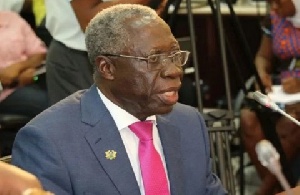Many a Ghanaian expresses a candid opinion of seeing no relevance of the functions of a Senior Minister in the current democratic dispensation of Ghana. For such a person, it is a complete waste of space, waste of precious time and national resources.
In other jurisdictions like the United Kingdom, the two most Senior Government Ministers are the Chancellor of the Exchequer – the senior minister at HM Treasury – and the Lord Chancellor - the secretary of State for Justice. Senior Ministers are given a higher order of precedence after the Deputy Prime Minister and serve as part of the Prime Minister's Office. In Singapore, the Senior Minister works at The Istana. The Istana is the office of the President of the Republic of Singapore and is used to receive and entertain state guests. The title "Senior Minister" was also a title used in Canada, before "Deputy Prime Minister" was introduced in 1977.
However, in Ghana, the creation of the post of a Senior Minister seems to be an innovation without solid foundation but a reward for being the oldest and probably the most experienced person in a political party in government; a person who had once served in various capacities in the party and has been instrumental in the successes of the party.
We have a President, a Vice President and the Government Sector Ministers; why then a Senior Minister, some people do query?
In Dr Kwame Nkrumah's Convention People's Party (CPP) government, he had Ministers without Portfolio, among whom was Krobo Edusei, the Member of Parliament for then Sekyere East Constituency (Kumawu, Asokore and Effiduase). He was a high-profile member of Dr Kwame Nkrumah's government. He served variously as Minister without Portfolio, Minister for Agriculture, Minister for Transport and Communication and Minister for the Interior under Dr Kwame Nkrumah.
A minister without portfolio is either a government minister with no specific responsibilities or a minister who does not head a particular ministry.
I stand to be corrected, the post of Senior Minister as found in Ghana bestows on the holders of the office oversight responsibility over the other Sector Government Ministers. If this is the case in the wisdom of the selecting president, having in mind that whoever is selected will help the president and the government achieve their ideal goals, then I shall advise that we look beyond the seniority of age of that person and how he/she had contributed to the successes of the party. Is the person being selected relevant in current times to the aspirations of the party and the nation? If yes, go for him. If no, dump him.
In looking for someone to help the party and the nation achieve certain set objectives in the best interests of the nation and the people, then the criteria for appointing a Senior Minister must not be old age and past unequalled services rendered to the party but the person's current services to the party and the nation coupled with their farsightedness to achieving the credibly set objectives for the party and the nation.
Controversial personalities, suspected or potential corrupt persons, and selfish individuals, should not under the sun, the moon and the stars, be appointed to the position of a Senior Minister.
I know of two Senior Ministers in the administrations of NPP. Under President Kufuor's NPP government, we had his alleged brother-in-law, the late Hon. J. H. Mensah, as the Senior Minister. He was an internationally acclaimed economist. In the current President Nana Addo Dankwa Akufo-Addo's NPP government, we do have Hon. Osafo Maafo as Senior Minister.
If the role of Senior Minister is actually indispensable in the governments of NPP, then I will suggest to the presidents to look beyond age and past experiences, personal friendships and family affiliation, when choosing candidates for the position. Again, those appointed to the post must not be allowed to hold onto it as long as the president and the government last, but be changed once their position becomes untenable by discovered certain compromising actions by them.
This is a word of caution for our presidents.
Opinions of Sunday, 27 December 2020
Columnist: Rockson Adofo















